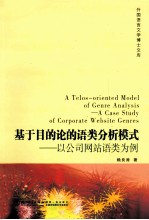

基于目的论的语类分析模式 以公司网站语类为例PDF电子书下载
- 电子书积分:12 积分如何计算积分?
- 作 者:赖良涛著
- 出 版 社:厦门:厦门大学出版社
- 出版年份:2012
- ISBN:9787561543610
- 页数:305 页
Chapter 1 Introduction 1
1.1 Rationale for the Study 1
1.2 Aim and Research Questions 3
1.3 Data Collection and Methodology 4
1.4 Organization of the Book 5
Chapter 2 Literature Review 8
2.1 Aristotle's Ideas about Genre 8
2.1.1 Literary Genre 8
2.1.2 Rhetoric and Genre 11
2.1.3 Assessment 13
2.2 Bakhtin's Theory of Speech Genres 15
2.2.1 Utterance as the Real Unit of Speech Communication 15
2.2.2 Genre as Type of Utterances 17
2.2.3 The Dialogic Nature of Utterances and Genres 17
2.2.4 Genre and Style 18
2.2.5 Genre as Ideological Forms 19
2.2.6 Assessment 19
2.3 Genre in New Rhetoric 21
2.3.1 Genre as Action-Based Discourse Classification 21
2.3.2 Genre as Response to Recurrent Rhetorical Situations 23
2.3.3 Meaningfulness of a Genre 24
2.3.4 Cultural Basis of Genre 26
2.3.5 Methodology 27
2.3.6 Assessment 28
2.4 Genre Studies in ESP 29
2.4.1 Definition and Characteristics of Genre 29
2.4.2 Genre in a Discourse Community 31
2.4.3 Pre-genre and Genre Differences 32
2.4.4 Schematic Structure 32
2.4.5 Methodology 33
2.4.6 Applications to ESP 33
2.4.7 Assessment 34
2.5 Genre Theory in SFL:Halliday and Hasan 35
2.5.1 Halliday's Ideas of Genre 35
2.5.2 Hasan's Theory of Genre 36
2.5.3 Assessment 37
2.6 Genre Theory in SFL:Martin and His Colleagues 39
2.6.1 Definition of Genre 39
2.6.2 The General Approach 40
2.6.3 Theoretical Positioning of Genre 41
2.6.4 Functional Parameters for Studying Genre 42
2.6.5 Genre Structure 43
2.6.6 Macro-Genre 43
2.6.7 Contextual Metaphor 44
2.6.8 Genre and Ideology 44
2.6.9 Assessment 45
2.7 A Note on the Study of Web Genres 46
2.7.1 Web Genre Studies in Information Sciences 47
2.7.2 Web Genre Studies in Social Semiotics 48
2.8 Summary 50
Chapter 3 A Teleological Perspective to Genre 52
3.1 An Integrated Model of Genre Analysis 52
3.2 The Nature of Genre 54
3.2.1 The Teleological Nature of Genre 55
3.2.2 The Social Nature of Human Action 57
3.2.3 Genre as Typified Telos-oriented Social Action 58
3.2.4 Teleological Structure of Social Action 60
3.3 A Telos-Oriented Genre System 63
3.3.1 Mutual Compatibility Between Smith's and Leontjev's Theories 64
3.3.2 Structural Units of Genre Analysis 64
3.3.3 A Teleological Genre System 66
3.4 Genre Staging:The Derivation of Schematic Structure 69
3.4.1 Staging as a Result of System Realization 69
3.4.2 Order vs.Sequence 70
3.4.3 Text Dynamics 72
3.5 Inter-Genre Relations 74
3.5.1 Genre Complexing and Embedding:Macro-Genres 74
3.5.2 Genre Agnation 75
3.6 Genre Realization 77
3.7 Genre/Register Instantiation 80
3.7.1 Coupling 81
3.7.2 Commitment 83
3.7.3 Iconization and Dual Instantiation 87
3.8 Genre Individuation 88
3.9 Register Patterning 92
3.9.1 Mode 93
3.9.2 Tenor 95
3.9.3 Field 96
3.10 Discourse Semantic Systems 98
3.11 Application of the Model 101
3.12 Summary 104
Chapter 4 Corporate Website Genres and Their Realization 105
4.1 Operating Procedures 106
4.1.1 Teleological and Generic Structures 107
4.1.2 Realization at the Genre and Register Strata 108
4.1.3 Realization at the Discourse Semantic Stratum 112
4.2 Descriptive Reports 118
4.2.1 Teleological and Generic Structures 120
4.2.2 Realization at the Discourse Semantic Strata 121
4.2.3 Realization at the Register and Genre Strata 131
4.3 Compositional Reports 133
4.3.1 Teleological and Generic Structures 135
4.3.2 Realization at the Genre and Register Strata 136
4.3.3 Realization at the Discourse Semantic Stratum 138
4.4 News Stories 144
4.4.1 Teleological and Generic Structures 146
4.4.2 Realization at the Genre and Register Strata 146
4.4.3 Realization at the Discourse Semantic Stratum 149
4.5 Summary 158
Chapter 5 Instantiation of Corporate Website Genres 160
5.1 Instantiation of the Descriptive Report Genre 160
5.1.1 Instantiation at the Genre Stratum 164
5.1.2 Instantiation at the Register Stratum 166
5.1.3 Instantiation at the Discourse Semantic Stratum 168
5.2 Instantiation of the Corporate Homepage Genre 186
5.2.1 Corporate Homepage as a Genre 186
5.2.2 Instantiation at the Genre Stratum 190
5.2.3 Instantiation at the Register Stratum 193
5.2.4 Instantiation at the Discourse Semantic Stratum 196
5.3 Summary 208
Chapter 6 Individuation and Complexing of Corporate Website Genres 210
6.1 Individuation of the Descriptive Report Genre 210
6.1.1 Individuation at the Discourse Semantic Stratum 211
6.1.2 Individuation at the Register and Genre Strata 237
6.2 Affiliation-Another Side of Individuation 243
6.3 A Note on Macro-Genres 247
6.3.1 Corporate Content-Page Genre 248
6.3.2 Macro-genres on Corporate Websites 250
6.4 Summary 261
Chapter 7 Conclusion 263
7.1 Summary of the Findings 263
7.2 Significance of the Research 271
7.3 Limitations and Suggestions for Future Work 273
Appendix Data Samples 275
Bibliography 291
- 《水面舰艇编队作战运筹分析》谭安胜著 2009
- 《分析化学》陈怀侠主编 2019
- 《影响葡萄和葡萄酒中酚类特征的因素分析》朱磊 2019
- 《仪器分析技术 第2版》曹国庆 2018
- 《全国普通高等中医药院校药学类专业十三五规划教材 第二轮规划教材 分析化学实验 第2版》池玉梅 2018
- 《Power BI数据清洗与可视化交互式分析》陈剑 2020
- 《行测资料分析》李永新主编 2019
- 《药物分析》贡济宇主编 2017
- 《土壤环境监测前沿分析测试方法研究》中国环境监测总站编著 2018
- 《药物分析》童珊珊,余江南 2019
- 《大学计算机实验指导及习题解答》曹成志,宋长龙 2019
- 《大学生心理健康与人生发展》王琳责任编辑;(中国)肖宇 2019
- 《大学英语四级考试全真试题 标准模拟 四级》汪开虎主编 2012
- 《大学英语教学的跨文化交际视角研究与创新发展》许丽云,刘枫,尚利明著 2020
- 《复旦大学新闻学院教授学术丛书 新闻实务随想录》刘海贵 2019
- 《大学英语综合教程 1》王佃春,骆敏主编 2015
- 《大学物理简明教程 下 第2版》施卫主编 2020
- 《大学化学实验》李爱勤,侯学会主编 2016
- 《中国十大出版家》王震,贺越明著 1991
- 《近代民营出版机构的英语函授教育 以“商务、中华、开明”函授学校为个案 1915年-1946年版》丁伟 2017
